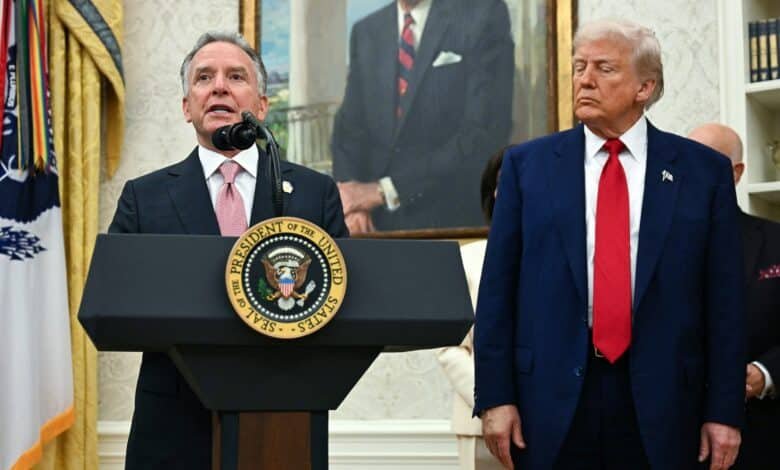As a founder of Ukraine Negotiations, Trump turns to the Middle East for signs of progress: Analysis

As negotiations to end the war in the Ukraine stand, the Trump administration turns to the Middle East to highlight progress towards historic transactions and to achieve the president’s wish to be a global peacemaker.
Trump’s special envoy for the Middle East and the essential mediator Steve Witkoff made a surprise announcement to the White House on Wednesday, declaring that he thought that a temporary truce in Gaza was now at hand – and that she could lead to “a peaceful resolution of this conflict”.
“I think we are about to send a new mandate sheet, which, hope, will be delivered later today. The president will examine it, and I have very good feelings at the idea of achieving a long-term resolution,” said Witkoff.
US officials said they expected the framework to be transmitted to Israel and Hamas via mediators on Wednesday or early Thursday, and that the reason for the optimism of Witkoff was that the administration considers that the terms of the new talks guarantee will continue after the initial hostage release and the 60-day cease-fire to appeal to the two parties.

The special envoy in the Middle East Steve Witkoff speaks to the Meida while President Donald Trump listens to the White House Oval Office in Washington on May 28, 2025.
Jim Watson / AFP via Getty Images
Any rupture in the war would also present the opportunity to balance a new effort supported by the United States to distribute humanitarian aid in Gaza, which was criticized this week after several videos showing generalized chaos on distribution sites emerged.
Negotiations can always face a difficult battle, especially with Hamas.
The three -day initial peace agreement aimed at ending the war in Gaza, which was negotiated by members of the Biden and Trump administrations, collapsed in March after Israel sought to extend the initial stadium of the agreement to save more Gaza prisoners without making more in -depth negotiations to reach a solution to two countries. At the time of the collapse of Deal, the Trump administration supported the projection of Israel.
However, the president has since adopted a more severe approach to Israeli Prime Minister Benjamin Netanyahu, revealing on Wednesday that he had told him that it would be “inappropriate” to hit Iranian nuclear installations.
“I told him that it would be inappropriate to do now because we are very close to a solution. Now that could change at any time, could change with a telephone call. But at the moment, I think they want to conclude an agreement,” said Trump about Iran.
“We are doing very well with Iran,” he said. “We have made a lot of progress, and we will see.”
In the past few weeks of direct and indirect negotiations with Iran, Trump administration officials have become more and more optimistic about the potential to negotiate a nuclear agreement, although officials say that there are still several key gaps – especially if Tehran would be authorized to continue to enrich its own uranium or if it would have resorted to the import of equipment to feed its civil nuclear program.
The administration has explored a certain number of measures to demonstrate tangible progress from its talks with Iran, in particular the possibility of publishing a sort of joint memorandum with Iran and potentially expanding the American delegation merchant with Iran to include Secretary of State Marco Rubio, according to two familiar US officials with the question that has noticed that the decision of the State has not been reached.
During the negotiations between Russia and Ukraine, the president said that he would give Moscow more time before determining if Russian President Vladimir Putin really wanted peace.
“I can’t tell you. But I’ll let you know about two weeks,” Trump said on Wednesday. “We will find out whether or not we use it or not. And if it is, we will answer a little differently. ”
Russia proposed to send a delegation of work level to Istanbul to present Ukraine with its conditions to reach a short -term ceasefire next week – which it calls a “peacemorandum” – but Ukrainian officials supported late.
“Why wait until Monday? If the Russians finally developed their” memorandum ” – after ten days of reflections and attacks – it can be transmitted to us immediately,” said Ukrainian Minister of Foreign Affairs Andrii Sybiha.
Kremlin criticisms believe that the dissemination of direct talks plays the battlefield strategy of Russia, because intelligence indicates that Moscow continues to prepare for an offensive in warm weather aimed at capturing significant quantities of Ukrainian territory, even if it continues to participate in the peace process led by the United States to end the war.





